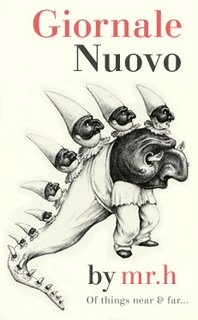Nonmaterialist Neuroscience
Warning of ghosts in the machine:
 Today's issue of Science has a letter from neuroscientist Martha Farah and theologian Nancey Murphy warning against 'non-materialist neuroscience' becoming the new front-line in the religion wars.
Today's issue of Science has a letter from neuroscientist Martha Farah and theologian Nancey Murphy warning against 'non-materialist neuroscience' becoming the new front-line in the religion wars.Most religions endorse the idea of a soul (or spirit) that is distinct from the physical body. Yet as neuroscience advances, it increasingly seems that all aspects of a person can be explained by the functioning of a material system. This first became clear in the realms of motor control and perception. Yet, models of perceptual and motor capacities such as color vision and gait do not directly threaten the idea of the soul. You can still believe in what Gilbert Ryle called "the ghost in the machine" and simply conclude that color vision and gait are features of the machine rather than the ghost.
However, as neuroscience begins to reveal the mechanisms underlying personality, love, morality, and spirituality, the idea of a ghost in the machine becomes strained. Brain imaging indicates that all of these traits have physical correlates in brain function. Furthermore, pharmacologic influences on these traits, as well as the effects of localized stimulation or damage, demonstrate that the brain processes in question are not mere correlates but are the physical bases of these central aspects of our personhood. If these aspects of the person are all features of the machine, why have a ghost at all?
By raising questions like this, it seems likely that neuroscience will pose a far more fundamental challenge than evolutionary biology to many religions. Predictably, then, some theologians and even neuroscientists are resisting the implications of modern cognitive and affective neuroscience. "Nonmaterialist neuroscience" has joined "intelligent design" as an alternative interpretation of scientific data. This work is counterproductive, however, in that it ignores what most scholars of the Hebrew and Christian scriptures now understand about biblical views of human nature. These views were physicalist, and body-soul dualism entered Christian thought around a century after Jesus' day.






































































































24 Comments:
Very interesting, Indie.
Like intelligent design, I think this nonmaterialist neuroscience is disingenuous and displays a lack of faith.
Science has been able to pinpoint some cause and effect from neurobiological perspective, but that is a far cry from explaining away the soul.
For example, perhaps the soul creates the individual brain as it is to serve the soul's purposes in this incarnation. That's a bunch of hypotheticals that I don't necessarily buy lock, stock and barrel -- rather, I am proposing it as an example as to how an answer creates many more questions and knowledge leads to additional mysteries.
I don't see why we need to limit our scientific exploration in order to keep our spirituality.
And shouldn't our understanding of spirituality evolve just as our understanding of our environment does?
This article brings up some good questions. However, I'm growing weary of this trend that places willful ignorance on a religious pedestal.
Not that science should be placed on a pedestal either, but (at least in theory if not in practice) science is supposed to constantly re-examine its assumptions.
What would happen if we placed that same expectation on religion. (As I believe spirituality strives to question its assumptions, maybe kinda sorta... It's all very nebulous isn't it?)
I'm beginning to see concepts on all sides muddled and confused. There is a distinct fuzziness of terms and definition.
Different points-of-view bring their setpoints and contexts to the table and paradigms collide and clash, yielding a great deal of heat yet very little light.
Most of the great insights throughout history have come in a flash, not by way of rigid processes or deduction. These issues will only be resolved in similr ways, I figure. It'll take an Einsteinlike avatar. And even Einstein and Jesus couldn't initially get their insights through to the masses.
I go on instinct in these matters.
Your "understanding of spirituality" cannot evolve because there is no evidence for its existence in the first place. You can only change your mind about what "spirituality" means.
You can scrutinize science because the basis of it is observable and tangible. Spirituality, on the other hand, is just a matter of "faith".. which basically means it's just something you've made up and decided to think is true.
All due respect, Tom, that's a fairly trite and incomplete analysis.
Ever study Spinoza? Einstein thought he was on the right track, and Einstein was no fool.
We've been down this path before.. but if you show me a single shred of evidence for "spirituality", then I'll help you write it up for publication and we can split a Nobel Prize. How's that sound?
Here's what Einstein actually said;
"I believe in Spinoza's God who reveals himself in the orderly harmony of what exists, not in a God who concerns himself with the fates and actions of human beings."
Which is essntially how I view things as well, but it's just a big guess.. as Einstein indicates. There is zero evidence.
Contrast with what La Sirena said above;
Like intelligent design, I think this nonmaterialist neuroscience is disingenuous and displays a lack of faith.
I'm really getting irritated with people panning actual science, because it "lacks faith". Meaning.. it "lacks made up shit that I think is true".. which is utter horesehit..
But.. what I said was "trite"? Please..
Trite, glib, smug and utterly dogmatic. You sound like a scientistic inquisitor.
Your argument is trapped by it's own terminology and you try to confine spirituality to traditional mythos. Try to understand the underpinnings and you won't be comparing apples and oranges. More like apples and architecture, in your case.
Here's a bit of Spinoza's take, which strips away the mythic context and church dogma:
In the Ethics Spinoza rejects the traditional providential God of the Jewish and Christian religions. The notion of a benevolent, wise, purposive, judging God is, he insists, an anthropomorphic fiction, one that gives rise only to superstition and irrational passions. God, according to Spinoza, is nothing but the active, generative aspects of nature. In an infamous phrase, Spinoza refers to Deus sive Natura (God, or Nature), and identifies it with the substance, essential attributes, and causal principles of the universe. All beings are "in" God, but only in the sense that Nature is all-encompassing, and nothing stands outside Nature's laws. Everything happens in Nature with a deterministic necessity. Even human beings, often (he alleges) regarded as autonomous creatures whose freedom puts them outside Nature's dominion, are a part of Nature and thus subject to its rigorous determinism. Some measure of freedom or "activity" is obtainable for human beings but only insofar as they can achieve an intellectual understanding of Nature and themselves and thereby exercise control over their passions. Spinoza adopts a Stoic conception of human well-being. Happiness is the result of virtue and consists in success in the pursuit of knowledge and self-mastery. Moreover, the rewards of virtue are to be found in this life. While human beings do "participate" in eternity, particularly through the knowledge they acquire, there is no personal immortality. Spinoza's metaphysics, epistemology, and moral philosophy reveal a variety of influences, especially Descartes, medieval Jewish philosophy, and ancient sources. However, there can be no denying the originality of his thought.
In the Theological-Political Treatise Spinoza turns to a critique of organized religion and an investigation into the status, history, and interpretation of the Bible. He begins with a deflationary account of prophecy (the prophets, he insists, were simply people with highly active imaginations) and a denial of the possibility of miracles (since Nature's laws admit of no exceptions). He insists, moreover, that Jewish ceremonial law was only of temporary validity (that is, during the Temple period) and is no longer binding on contemporary Jews. His most stunning theses, however, concern Scripture. Spinoza argues that the Bible is not literally of divine origin and that its first five books (the Pentateuch) are not the writings of Moses. Rather, Scripture as we now have it is simply a work of literature, a compilation of human writings passed down through generations and edited in the Second Temple period. Others before Spinoza had suggested that Moses was not the author of the entire Pentateuch, but no one had taken that claim to the extreme limit that Spinoza did, arguing for it with such boldness and learning and at such length. Nor had anyone before Spinoza been willing to draw from it the conclusions about the interpretation of Scripture that Spinoza drew. The meaning of Scripture is to be sought not by appeal to theological dogma or to demonstrated truth—after all, the authors of Scripture were neither theologians nor philosophers—but by a close examination of the texts themselves and by a historical investigation into the backgrounds and intentions of its authors. If there is a universal truth conveyed by Scripture, it is a simple moral principle: love God and your neighbor.
Spinoza's discussion of Scripture takes place in the broader political context of his argument for a liberal, tolerant secular state, one in which the freedom to philosophize is defended against attempts to make it conform to so-called religious truth. For it is the "excessive authority and egotism of preachers," he tells one of his correspondents, that most threatens the freedom "to say what we think." The key to diminishing the undue influence of the clergy, who justify their abuses by appealing to the holiness of a certain book as the Word of God, is to demonstrate the true nature of Scripture and its message and eliminate the "superstitious adornments" of popular religion. By naturalizing Scripture, Spinoza hopes to redirect the authority invested in it from the words on the page to its moral message; and by formulating what he takes to be the proper method of interpreting Scripture, he seeks to encourage his readers to examine it anew and find therein the doctrines of the true religion. Only then will people be able to delimit exactly what needs to be done to show proper respect for God and obtain blessedness.
--------------------------
Insisting on evidence or proof is ridiculous and silly.
I'm not saying Spinoza had it knocked, just that he was basically on the right track. Particularly with the the last bit of the above.
Tom writes: "...but if you show me a single shred of evidence for "spirituality"..."
What if I could show you evidence, but you're just not capable of understanding and interpreting the evidence? What if you were required to show a single shred of evidence for "cosmic black holes" to a bushman? I don't think you could.
"You can scrutinize science because the basis of it is observable and tangible."
Isn't quantum physics a science? There are many physicists who would argue that the very basic particles of our universe are hardly observable and even less tangible. Do you believe in the Higgs Boson more or less than the idea of a soul? Why?
Now, I'm not knocking science, but I'm saying that science is just as fuzzy around the edges as spirituality, and both have many facets that defy explanation.
Insisting on evidence or proof [of spirituality] is ridiculous and silly.
That's going to be a "quote of the day" on my blog tomorrow... coz.. you know.. I'm being "ridiculous and silly" as opposed to simply accepting something that's completely made up without a shred of evidence. Ya.. that makes perfect sense.
I'm not confining spirituality to any mythos, but the two are essentially the same. Both without a single shred of evidence. To be sure, there's nothing inherently "wrong" with belief in any sort of spirituality you want. Heck, the Mormons might be right and God might live on Kolob.. I don't know.. but then, neither do they. My point is the panning of neuro science because it "lacks faith". You want to talk about "silly"? Try calling a scientific study on neuro science "disingenuous", because it "lacks faith", at any university in the world and see if they don't simply point at you and laugh.
That's simply a fact, and no amount of "Spinoza had a complicated philosophy" is going to change that. And ya, Spinoza had a complicated philosophy that was quite elegant, and I agree with his view on organized religion vs. spirituality. That's neither here nor there, nor has anything at all to do with a smug dismissal of reality-based science. In other words, you built a hell of a straw man argument, and then claimed that Einstein agreed with it.
Again, go back to the very fist comment that I had an issue with;
Like intelligent design, I think this nonmaterialist neuroscience is disingenuous and displays a lack of faith.
That didn't just jump out at you as bizarre? Really? Darth Vader couldn't have said it any better. Equating neuro science and ID? Come on.
And for JoeC, that's a perfect example of what i'm talking about.
You're argument about a bushman not understanding black holes is silly. Take the bushman to university, get him a degree in physics.. and there you go. I'm saying you have zero evidence.. none.. nada.. zip.. of any sort of supernatural activity. But, your example of the Higgs Bosun is perfect. You know what it is? It's a theory, a mathematical prediction. Nobody know whether or not it really exists. That's the point of the particle accelerator experiments. The theory makes predictions that can be tested, and we might find out the data matches the prediction and if the theory sound.. or it might not. We'll see.
Saying that "science is just as fuzzy as spirituality" is complete bs. Spirituality has zero evidence..Science has a large body of evidence that is continuously studied and refined. They aren't even remotely on the same level of "completely made up". That attitude is exactly where wacky things like "creationism" come from.
Tom, Your argument is silly and specious because is it so pretentious, presumptuous, pompous and behind the curve.
You make it sound like reality needs science's permission. Aspects of reality don't wait for clever ways of measuring to be devised. Light operated as a particle and a wave before it was "tested". E=MC2 didn't wait for Einstein, science did.
There is nothing supernatural, just aspects of nature yet to be understood. Spooky action at a distance was once "supernatural". Quantum entanglement ought to teach anyone to be wary of being overly certain in their opinions.
This past decade had plenty of discussion among scientists of the way quantum theory and quantum mechanics parallel and affirm much of Eastern religious thinking. Read The Tao of Physics, if you need "proof".
The following article takes to task arguments like yours:
What's wrong with science as religion
By Karl Giberson
Piercing a Communion wafer with a nail and throwing it in the garbage, as one crusading biologist recently did, does science no favors.
---
We are arguing different matters, perhaps, but you can never prove a negative. Lots to be learned yet.
By the way, Tom, we are Bushmen in our own right...I think that was Joe's point.
You're conflating "spirituality" and "science". I wonder why you do that? I don't "presume" anything, that's the whole point! You presume we're just not enlightened enough to understand the supernatural yet.. or something.
I knew you were going to do the "you view science as a religion" straw man. It's another way of conflating spirituality and science in order to place science on the same level as spirituality. By "level" I do not mean one superior to the other, but rather that science is completely different.
When PZ Myers "desecrated" the Eucharist, he wasn't abusing Christ.. he simply threw a cracker in the trash along with a page of a book and a banana peel. That's the point that you refuse to acknowledge. It's just a cracker. It's just a banana peel... and science is not a religion, but you will refuse to acknowledge what it really is.. and what it really is, is exceptionally simple.
When somebody says "Piercing a Communion wafer with a nail and throwing it in the garbage, as one crusading biologist recently did, does science no favors", they miss the point that science doesn't need favors. It's not a philosophical movement. If somebody is offended, that's their problem, and their problem alone. It makes absolutely no difference to anything beyond that because science does not have an agenda. In real terms, it cannot offend anyone, and is not affected by popular opinion. It makes no difference if somebody is emotional about it.
You cannot understand that because you cannot understand the fundamental difference between science and spirituality. It just doesn't register in your brain as evidenced by pointing out the "does science no favors" argument.
I understand that people can't understand the distinction, and the study referenced in the original post of this thread explains why that is. Your biology prevents you from understanding that. Pure physical composition leads you to the cracker argument, and you're unable to understand why that argument is completely irrelevant.
To be sure, you appear quite articulate, and this is not some sort of personal attack, it's simply an exercise at pointing you back to the very original topic of neuro science and try and get you to examine yourself and see how that very topic affects you so deeply without your even knowing it.
There is no "evolution" of man as the bushman that will ever reveal your spirituality. You can keep trying to conflate science with it, but real scientists reject that premise. "Spooky action at a distance" is not supernatural, any more that claiming "God" is just hidden until we achieve some new understanding that will reveal God to us. You can call "spooky action at a distance" as once-upon-a-day supernatural, but just because you say it, doesn't make it so. That same point of view would claim gravity as supernatural once upon a time.
God will never be revealed.. but this thread is an exceptionally important discussion because it is the door that religious lunatics are trying to use to blur the lines of science and their wacky, made up, bullshit. It ends up with a museum displaying a dinosaur with a saddle on it.
You will not find a welcome audience for such tripe in the vast majority of academic circles. You will not successfully link Spinoza, and those with more "Deist" viewpoints such as Einstein, to this idea that the supernatural exists and we're just not able to understand or comprehend it yet.
There is no evidence for the supernatural, and by it's definition, there will never be such evidence. It's important that that idea be thoroughly discredited because it is not helpful to real research and scientific examination.
That's why Myers nailed the cracker. That's exactly why he did it, and other people just see "ohhh he offended me". They don't get it at all.. but people like he and Dawkins and Dennet, as well as lesser minions like myself, will continue to make that point. Say anything you want about the personalities involved (and it's irrelevant), but at the end of the day, the institutions of science.. the scientific method.. will not care that anyone is "pompous" or whatever, because it can't.
You can trivialize that argument by claiming it another version of religion, but it's a straw man... so please.. stop with the attacks on real science with the "faith" canard.
.. and I'll be waiting for any shred of evidence of "spirituality" so I can publish it and claim my Nobel Prize. I'm just not going to hold my breath, while people throw a tantrum about my not seeing the obvious.
"Academic circles"? You mean that place where people say one thing for the record, and often what they truly think off it?
You accuse me of comparing science and spirituality when, in fact, I find them incomparable (despite uncanny parallels). I never defended anything specific, and only argued that 'there are none so blind as those who will not see', and history is rife with illuminated minds with opinions not dissimilar to your own who came around, eventually. Honest opinions deserve respect, but certainty is folly.
No tantrums here, you're just lost in your own ivory tower paradigm. Enjoy.
----edited
BTW, Tom, thanks for your effort and contribution here. I just wish the argument was on the same page. But grinding an axe against religious snake oil doesn't address anything meaningful.
If you get some time.. couple hours, and want to explore the issue, stated much better than I have..
http://www.youtube.com/watch?v=9DKhc1pcDFM
Maybe re-read this thread first.. focusing more on what you've said than I.. and see if anything in the video resonates.
At the very least, and in the first moments of the video, it'll explain why you characterized me as "pretentious, presumptuous, pompous", etc.
As I've said.. this is one of the most important issues to me personally, and engaging in the debate often helps me sharpen my argument and, frankly, gives me fodder for additional essays.
I will admit to one thing you've said of me. I do enjoy the ivory tower. When around intellectuals who agree with the central thesis of what is, and what is not evident is wonderful. I'd love to spend an afternoon with the gentlemen in the video.
The problem is not that I don't understand your position, it is in the cognitive disconnect of the discussion.
It isn't about what is evident, it's more about what's hiding in plain sight. The undiscovered territory, for some. And, personally, I find surrounding myself with intellectual clones as clinically sterile as any other ivory tower aspect.
Each to their own, but anyone who thinks they can fully understand reality from a purely materialist perspective will be operating without a full set of tools.
A lot of words to say "there's stuff we don't know about"..
duh
But you truly are the king of the straw man argument.. nobody.. not one person.. ever said they "fully understand reality". You just completely made that up, and then argued against it as if it makes your point.
I have a feeling that everything you do, everything you think about, everything you think you know, is just one big giant straw man argument that you've made up in your own mind because you simply cannot argue against what people are actually saying.
It's rather maddening that you do that over and over. Not just maddening.. but wacky crazy level of maddening.
And the disdain for intellectual agreement is amazing as well... touched with extra added straw man arguments again.. and again.. and again..
I never said, nor have I ever said anything that would lead a reasonble person to believe, that I'm a "clone" of anyone.. I respect their opinion, and agree with much of it.. but you have some weird hostility.. no hostility is not the word, it's not strong enough.. you have some strange anger, a highly emotional disdain, for anything that doesn't simply accept your version of what you think you understand, that which cannot be understood.
I mean.. holy shit.. welcome to bizzaro world... I really don't give a shit about your constant insults, but it is instructive.
And when you find something "hidden in plain sight", do let us all know. I'd still like to get that Nobel Prize.
Mutual admiration societies are the most boring of pseudo-intellectual circles.
You consistently miss the point, and mischaracterize the discussion. I give up. You really don't even begin to get it.
If you want to see clinical evidence for things hidden in plain sight, you have to open your eyes to it. Try Willam Tiller's Stanford experiments, for starters.
Enjoy your self=satisfaction, and I really mean that. I have no interest in convincing you of anything, or playing in the confines of your limited sandbox. Besides, it's beginning to seem the cat has crapped in it.
Waitl.. "pseudo-intellectual"? Oh.. that's right.. believing in made up bullshit is where the real intellect is at.
Okay.. I'll bite.. and look Tiller up..
These findings are not presently accepted by the mainstream scientific community.
umm.. lol.. dude you so pwned me with that remarkable piece of scientific evidence that the rest of the community laughs at. Damn I feel dumb now.
I get it now.. any whack job can postulate something psychic.. be ignored by the community because his data sucks.. and viola! Something that was hidden right in front of us is now revealed.
And not only that.. but what is regarded as the "scientific community" is a bunch of closed minded people, because they have rules about what is, and what is not, science... which, you know.. is an accepted standard by all but the fringe loons..
And Dennet was absolutely correct.. but I suppose I should remove my lips from his buttocks.. lol
That's brilliant... and I think we'll call this done.
OK, Torquemada (you really are taking on the mantle), but remember that Copernicus, Galileo, Einstein et al., were consider "fringe" and laughed at by the smug mainstream.
Wm Tiller's work has been considered respectable enough to garner him distinguished fellowships and mainstream work that I doubt you'll ever achieve, so a little perspective is in order.
But, this is another red herring, and misses the point again. There are sufficient indications in work like this to lead us forward in our understanding (not that it's the be all and end all), rather than sit facing comfortably backward wallowing in our safe notions of what is.
OK, Torquemada (you really are taking on the mantle), but remember that Copernicus, Galileo, Einstein et al., were consider "fringe" and laughed at by the smug mainstream.
Wm Tiller's work has been considered respectable enough to garner him distinguished fellowships and mainstream work that I doubt you'll ever achieve, so a little perspective is in order.
But, this is another red herring, and misses the point again. There are sufficient indications in work like this to lead us forward in our understanding (not that it's the be all and end all), rather than sit facing comfortably backward wallowing in our safe notions of what is.
One last bit:
Many believe that we are on the verge of a paradigm shift in our scientific thinking. The new physics is ushering in that belief. After reading The Dancing Wu Li Masters you will understand why people make that assertion. You will learn why it appears that our consciousness may help to create "reality" and how the scientist cannot help but influence the outcome of experiments on sub-atomic particles. You will also learn why the universe is not like a giant machine, with the implication that we are something more than organic robots or automatons. You will also see how the laymen's understanding of science is about a 100 years behind the times. You may be surprised to learn that, unlike a 100 years ago, science is no longer waging an all out assault upon religion. In fact science is beginning to support some of the fundamental tenets of most religions and is laying a groundwork for a new spirituality. I'm not suggesting that science is supporting the dogma which tends to surround institutionalized religion. It should also be noted that these are my interpretations, not those of Zukav per se. Zukav does, however, occasionally note the similarity between science and religion, such as in this passage where he has just explained how sub-atomic particles collide and annihilate each other, and from which new particles are born:
To me, saying, "spirituality has zero evidence" is missing the point.
It's a bit like saying 'scientific enquiry has no love'.
Whatever...
LOL. Yeah...quite a bit.
Or 'dancing about architecture', to steal a phrase.
word ver.- rechin.
Post a Comment
Subscribe to Post Comments [Atom]
<< Home